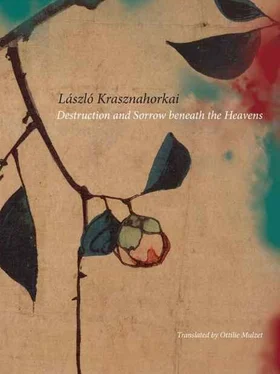pinghui. Generally, after seven. . Ah, no, excuse me that’s wrong, around eight-thirty or nine. .
Stein is thinking: What would happen if he would just overlook everything? If he would just ignore the fact that the abbot visibly does not want to talk about why they have sought him out. He speaks to the interpreter softly: Tell the abbot that he, Stein, is not interested in any of this. But ask him, and don’t let him not reply — would he take into consideration what is troubling Stein, what is oppressing him, what is making him feel that he is ruined — would the abbot listen to him then? Would he help him to solve this? Would he help him to find an answer? Would he let him into the monastery? Would he take him in here among the young monks? Is there a possibility of this? How does someone join the order here? How does it work?
pinghui. It’s possible.
Stein has no idea why he got an answer to his question this time. Emboldened, he continues, and asks: How does this work? What are the conditions? Can anyone come? He, Stein, could also stand in front of the gates, wait for three days, get drenched in the rain, not eat, then on the third day the gates will open, they will let him in, and. .
Pinghui raises his hand, silencing the interpreter.
pinghui. To begin with, there are three strict requirements: the applicant must be a believer, he cannot be involved in a court case, and we demand permission from the parents. If all this is in order, then there is a trial period of six months. We say that he can be a monk here whose ‘eyes and nose. . are in their place’.
And then, if these conditions are met and the six months are up?
pinghui. After six months we have a look, to see if all the conditions have been met — if so, we cut the novice’s hair. Then comes the shoujie,[120] then the phase of biqiu[121] for the men and biqiuni[122] for the women.
Stein is completely emboldened, because suddenly it’s as if they were really talking about something. Spurred on by a sudden idea, he says to the abbot that he has met with so many people in China, and he has always observed the forms of courtesy demanded by this country. Here, however, in this Buddhist temple, he does not consider this to be requisite. May he count on the understanding of the abbot? And may he say why he has come?
The face of Pinghui does not flinch for a second. He listens to the words of the interpreter without interrupting. He is thinking.
pinghui. Moments of prayer, when the believer stands in front of the Buddha with a pure soul, are extraordinarily important occasions. We have our festivals. For example, we commemorate the birth and death of Master Zhiyi, and every three years we have the Jiangjing festival lasting several days. Then, on the fifteenth day of the seventh lunar month, there is the Yulan fenghui[123]. .
They have fallen back to that place where they keep falling: Stein is unexpectedly seized by an embittered audacity. He doesn’t know what has suddenly come over him but, waiting after each sentence for the interpreter to render his words into Chinese, he takes no notice of what the abbot has just said and tells him what he thinks: that since he has arrived at this monastery, there has been deep sorrow in his heart. The interpreter stares at Stein. He tells the interpreter, if he can, to translate word for word. He has been full of pain, he continues, because what is important to him, the spirit of Chinese classical culture, its beauty, its strength, has disappeared — it disappeared a long time ago. Because for years he deluded himself that there was a point to his own research here, in modern China, and that he didn’t want to acknowledge how ridiculous it was, how truly pathetic.
The question never really gets to Pinghui, at least not in the form of words, because he’s already waving down the interpreter, this time clearly in great impatience when he gets to the part of Stein’s statement which deals with classical culture. Stein is convinced that the abbot knows full well, in fact knows with dead certainty what he is saying; moreover, that he knows, even without words, what Stein wants.
pinghui. In my opinion, classical culture has not vanished at all. Once again, you can see the buildings, paintings and calligraphy, all from the classical tradition and now restored — from that I draw the conclusion that this culture is still alive. There are the traditional ceremonies as well. These too have remained, even if in a somewhat different form. In the Japanese tea ceremony, the outward forms are the most important. For the Koreans, the taste of the tea is essential as well as the ceremony. In Chinese culture, tea drinking as a tradition has remained but without the formalities. So I would express it by saying that there is no ceremony, no formalities, but there is the inner content, there is prayer.
Venerable Abbot, Stein raises his voice — the clamour in the room abates for an instant — he, Stein, cannot believe what he is hearing! Does he really think that the feelings of the monks of recent times, this inner content, more important than anything else, has remained unharmed? Does he really think that the souls of the ones who live here now are the same as they were in the days of old? His, Stein’s, opinion is radically different. He thinks, says Stein — with clearly unforgivable discourtesy, he leans closer to the abbot — it’s not that these monks of today with their cell phones and their businesses aren’t like the monks from the Sui dynasty. Simply put, their hearts are not the same.
Pinghui doesn’t budge an inch, he doesn’t even adjust his eyeglasses which have slid down his nose a bit.
pinghui. There is an expression, suiyuan, which means something like ‘according to predestination’, ‘according to fate’. During the Sui dynasty, Buddhists lived according to the suiyuan of their time. Today they live according to the suiyuan of our time. The form is different but the essence is unchanged.
So why is it — Stein spreads his hands apart helplessly — that his impressions are so different? Is it because he is European? But, well, Venerable Abbot, he says, lowering his voice this time, everything that occurs in the name of rebuilding the temples, everything that Stein has spoken of so far — the chase after money, even allowing money into the inner world of the monasteries at all, the deluge of tourists and the tourist industry based on that deluge, fully integrated into temple life, all this. .
Pinghui cuts off his monologue.
pinghui. The monks study the same things today, the ding hui and the wuji bajiao. In the modern world, Taoism operates in a similar fashion. We use different words than the Taoists but we are searching for the same thing. That has not changed.
Stein leans back in the easy chair. He has seen the cities, he has walked along the streets, and here is a world which unfortunately he knows all too well. The supermarkets, the mega shopping centres — on the one hand, the fever to buy, and, on the other, the fever to sell, the desire to possess things, the empty rhythms in the temples. Venerable Abbot, he says to him confidentially, as if there were some kind of basis for this confidentiality — he, Stein sees the opposite of what the abbot has just said, that formally everything does proceed in the same way before the altars of the temples, but the inner essence has completely been lost. .
The abbot adjusts his eyeglasses.
pinghui. In the schools, the study of classical culture is accorded an ever-greater role. Here, for example, in the Buddhist schools, we teach the classical Chinese language and the culture of the pre-Qing dynasty. The culture of the Song and Tang dynasties. Here, for example, we teach Lunyu ,[124] Yijing,[125] Zhuangzi,[126] Mengzi[127] and Laozi.[128]
Читать дальше












